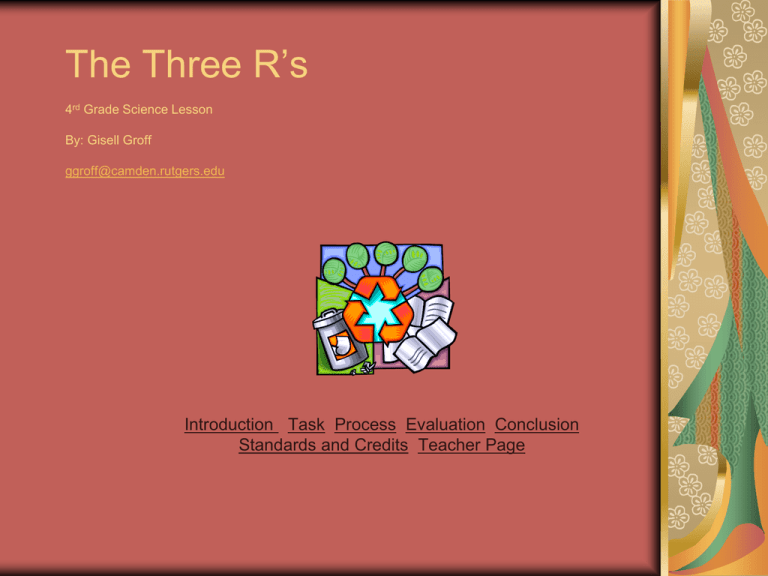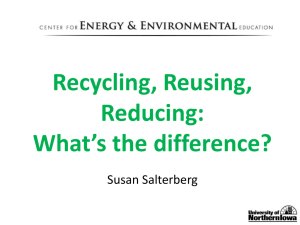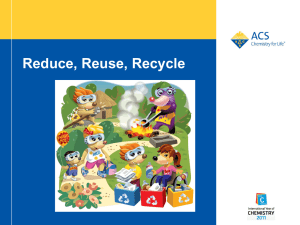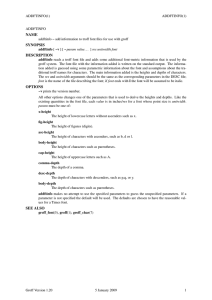The Three R's 3rd Grade Lesson By: Gisell Groff ggroff@camden
advertisement

The Three R’s 4rd Grade Science Lesson By: Gisell Groff ggroff@camden.rutgers.edu Introduction Task Process Evaluation Conclusion Standards and Credits Teacher Page Introduction Earth Day is coming up on April 22 and you and your partner’s job is to discover ways to protect our planet. You will do this by using the internet to gather the necessary information on ways to minimize waste production. Task The task is to find ways to have your community help in the process of reducing, reusing, and recycling. You may use anything you’d like to present your ideas to the community. This includes a PowerPoint, poster, video, etc. Be creative! The object is to get your message out to the community to help save planet Earth! Process Step 1: First you need to begin by answering a few questions. 1. Describe Earth Day? 2. Who created Earth Day and why? 3. Define each: Recycling, reducing, reusing. 4. Why is it important to use the three R’s ? 5. Compare and contrast some positive and negative effects of recycling? Step 2: Make sure you watch this video on the 3 R’s and answers These questions also. 1).From the video what were three examples of ways to reduce? 2). Find the three examples of reusing? 3). What were the three examples for recycling? 4). Brainstorm some ways you can Reduce, Reuse, and Recycle. Hint: This will help on the rest of the project! Step 3: You are now ready to start working on your campaign to reach out to the community on ways to help Reduce, Reuse, and Recycle. You will be presenting these to the class. Evaluation Beginning 1 Developing 2 Accomplished 3 Exemplary 4 Use of Class Time Did not use class time to focus on the project or distracted others. Used some time well. There was some focus on getting project done but occasionally distracted others. Used the time well, usually focused on getting project done, and never distracted others. Used class time well, always focused on getting the project done, and never distracted others. Preparedness Student seems not to be prepared. Some what prepared, but its clear there is a lack of rehearsal. Student is pretty much prepared, but a few more rehearsal are needed. Student is fully prepared and has obviously rehearsed. Content accuracy Content is not accurate at all. Content is or somewhat accurate, but needs more details. Content is accurate, but lacking in details. Content is very accurate and has much detail. Attractiveness Presentation is poorly designed, not attractive, and not thought out. Presentation is acceptably attractive, but it’s a little messy in the thought process. Presentation is attractive and pretty well thought out. Presentation is is exceptionally attractive and extremely well thought out. Score Conclusion Congratulations! You have just learned some information on Earth Day and the importance of the three R’s. You also learned the tools needed to design a campaign on your own. You even learned the positive and negative effects of recycling. Now write a few sentences describing what you learned. Knowing about what you have learned about the three R’s, will you change some things about the way you live? If so how? Standards • Language Arts Literacy STANDARD 3.3 : Speaking: ALL STUDENTS WILL SPEAK IN CLEAR, CONCISE, ORGANIZED LANGUAGE THAT VARIES IN CONTENT AND FORM FOR DIFFERENT AUDIENCES AND PURPOSES. STANDARD 3.5 : Viewing and Media Literacy ALL STUDENTS WILL ACCESS, VIEW, EVALUATE, AND RESPOND TO PRINT,NONPRINT, AND ELECTRONIC TEXTS AND RESOURCES. • Technology In grades 3-4, students understand the purpose of, and are able to use, various computer applications. They continue to develop information-literacy skills and increasingly use technology to communicate with others in support of learning, while also recognizing the need for cyber safety and acceptable use policies. Students in grades 3-4 also investigate the impact of technology systems, understand the design process, and use it for problem solving. 8.1.4.A.5 Determine the benefits of a wide range of digital tools by using them to solve problems. • Science Connections developed between fundamental concepts are used to explain, interpret, build, and refine explanations, models, and theories. 5.1.4.A.2 Use outcomes of investigations to build and refine questions, models, and explanations. Credits http://earthday.envirolink.org/history.html http://www.factmonster.com/ipka/A0775891.html http://www.highcountryconservation.org/reduce_reuse_recycle.htm http://www.brighthub.com/environment/green-living/articles/74374.aspx http://www.youtube.com/watch?v=wtoeZ9Nkeqk&feature=related https://www13.state.nj.us/NJCCCS/Worldclassstandards.aspx Teacher’s Page The Three R’s WebQuest created for 4th grade science class Designed by: Gisell Groff




